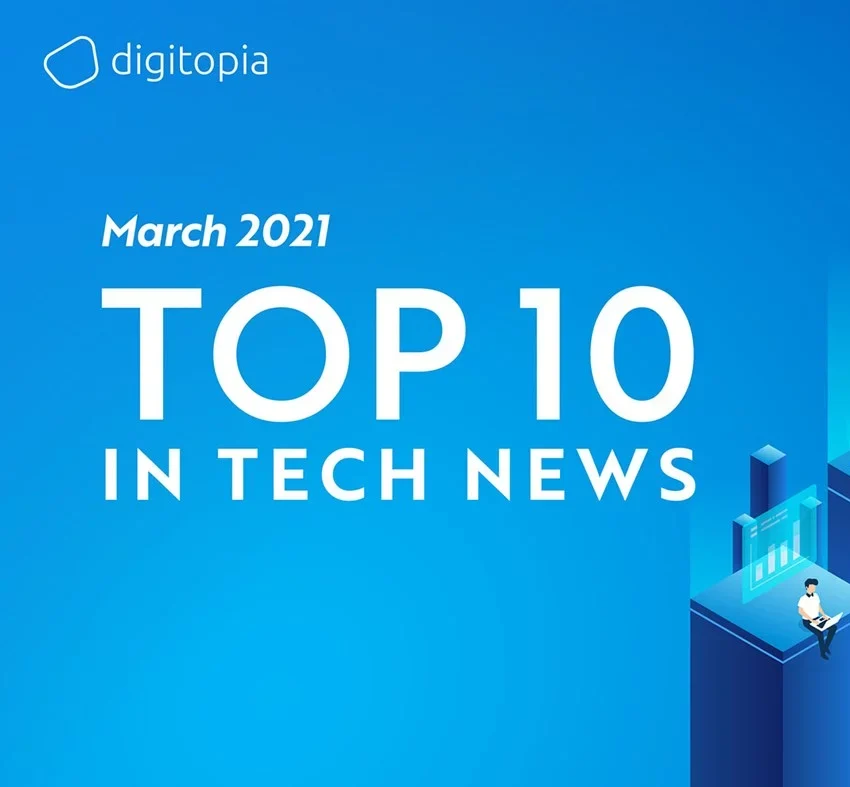
1. Crypto companies are tempting top talent away from Big Tech to build ‘Web3′
The omnipresent buzzword that has been touted as the future of the internet: Web 3.0, is attracting talent in big tech companies like Facebook, Amazon, Apple, Google and more.
Alex Bouaziz, CEO and co-founder of payroll software firm Deel states that “many are seeing it (Web3) as the future of the tech industry, in the same way that Facebook and Amazon were attractive in the past”, adding that people see it as an exciting opportunity to explore and be a part of its foundation. However, novelty is not the only attraction that Web3 possesses. Some startup bitcoin companies are offering up to $900,000 to hire software engineers, with many offering attractive stock options for potential employees.
We expect to see the Web 3.0 scene to become even more competitive in the coming months.
Source: CNBC
2. AI-powered visual inspection platform Overview raises $10M
Visual inspection has been at the center of operational excellence efforts for decades, with new tools and methodologies popping up each year. In the manufacturing industry there are now a considerable number of companies that are offering computer vision products to detect anomalies in the production process.
Overview, founded in 2018 by a group of former Tesla engineers, is one such product. The company has announced that it has raised $10 million in a series A funding round, bringing its total raised to nearly $20 million. The company will now be creating a platform that utilizes advanced AI and image capture to help customers identify manufacturing defects on the production line. The platform promises easy setup, greater accuracy and greater traceability of faults for customers.
Source: VentureBeat
3. Talespin raises $20M to train workers using spatial technologies
Talespin, a software company that is developing a virtual, augmented, and mixed reality platform to power talent development and skills mobility, has raised 20 million in funding.
The platform has drawn considerable interest by companies as it is seen as an opportunity to explore use-cases for the metaverse. This trailblazing delivery method offers accelerated learning, more efficient skilling programs and higher employee engagement, all by taking place in a spatial environment that boosts interactivity compared to current more two-dimensional alternatives.
Source: VentureBeat
4. Inside Pat Gelsinger’s audacious 43.5B plan to revive Intel
Intel, the multinational technology company has found itself in a disadvantageous position in the market over the past few years, especially after Apple’s introduction of Intel-free Macs. The company has also come under fire recently for negligence in its manufacturing facilities.
Years after losing their uncontested dominance in the industry, Intel is promising a revival and return to greatness, with recently-joined CEO Pat Gelsinger bringing ambitious plans for the company to become a manufacturing superpower and to diversify its profit areas.
Source: FastCompany
5. What’s the point of digital clothes?
With the spread of Metaverse, Digital Fashion, a concept that has been around for a long time, has become a more popular topic. However, digital fashion is not only designing clothes for avatars, but it is being touted as a culture where people can express themselves without being limited by the physical boundaries of real life.
As fashion has always been the business of selling fantasies, it is seen as an opportunity to make money by companies. The promise of digital fashion to be profitable, efficient and sustainable is still a matter of debate, but for now, we are limited to our physical clothes.
Source: vox.com
6. World’s largest NFT marketplace OpenSea is hacked.
Co-Founder and CEO of Opensea, Devin Finzer, has acknowledged a phishing attack against the platform which resulted in 32 users losing NFTs worth $1.7 million of Etherium in total. Finzer warned users against clicking links outside of the Opensea website and asked them to always “double check that you are interacting with Opensea’s website in your browser when you sign messages.”
The hack is thought to have happened as OpenSea announced a new smart contract upgrade and asked users to migrate their listed NFTs from ETH blockchain to a new smart contract. It has also been stated by the authorities that this is the first time UK law enforcement have seized an NFT.
Source: Tribune
7. Disney appoints a new executive to lead their metaverse strategy
Metaverse continues to be a focus of investment by the world’s leading companies and Disney is no exception. The company has appointed a new executive to specifically lead their Metaverse strategy, seeing it as the next step in the evolution of its almost 100-year-old storytelling tradition and “a perfect place to pursue their strategic pillars of storytelling excellence, innovation, and audience focus”.
Mike White, who has been with the firm for more than 10 years, will now be working as the senior vice president for Next Generation Storytelling and Consumer Experiences.
Source: BBC
8. The AI that can spot what cows may be hiding
CattleEye is a technology developed to automatically detect early signs of lameness in cattle, promising increases in productivity and animal welfare while reducing labour requirements. It helps farmers spot the earliest signs of lameness, preventing potential human error when observing the cows manually. According to the research, the AI system performed better than a human expert in terms of selecting those that had tissue damage in their hooves among the animals checked.
“Identifying lameness can be quite subjective for human observers and so such systems could make mobility scoring more accurate” states the animal charity RSPCA. Farms are increasingly turning to automation, joining many other industries that benefit from digital transformation to increase efficiency.
Source: BBC
9. China invests in metaverse
After U.S firms Meta and Microsoft’s entrance into the metaverse concept, China’s tech giants have started to take an interest in the space. Despite an enormous total addressable market of $8 trillion and companies like Tencent and Alibaba as frontrunners, China is said to be adopting a more cautious attitude compared to U.S firms’ more all-in approach.
Censorship, regulation and the issue of how separate Chinese users from the international space will be a main point of focus in the upcoming weeks and months.
Source: CNBC
10. Microsoft announces new universal app store
Microsoft announced its new universal App Store that will enable users from all different kinds of devices and platforms to access and download any app.
Following the announcement, some concerns have arisen from a legislative point of view regarding the competitive environment.
In the interview held with CNBC, Brad Smith, the president of Microsoft outlined their approach on these issues, stating that they would adapt to regulation rather than fight against it. The company then issued eleven app store principles on their website, describing their promises to competitors and developers.
Source: CNBC

